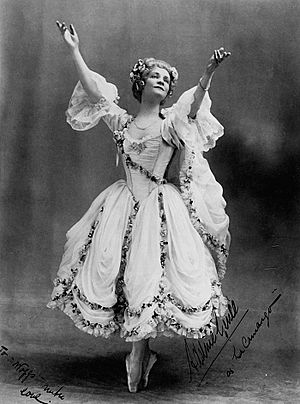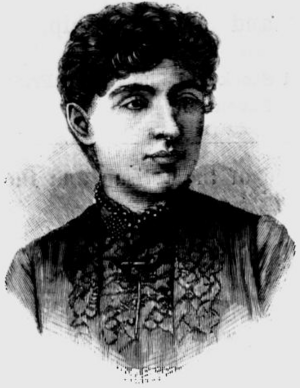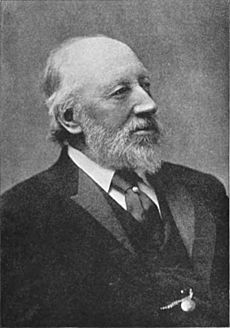Dora Bright facts for kids
Dora Estella Bright (born August 16, 1862 – died November 16, 1951) was an amazing English composer and pianist. She wrote many different kinds of music, including pieces for orchestras, pianos, and singers. She also created music for operas and ballets. Some of her most famous ballet music was for the dancer Adeline Genée.
Contents
Biography
Dora Bright was born in a place called Stanton Broom, in Sheffield, England. Her father, Augustus Bright, made and sold cutlery (like knives and forks). He was also a vice consul for Brazil, which meant he helped people from Brazil in Sheffield. He was also a captain in a local military group and played the violin as a hobby. In 1873, when Dora was nine, she even performed music with him at a concert!
Dora's mother, Katherine Coveney Pitt, was an actress, a writer of plays, and managed a theatre company. Her mother wrote several plays, and Dora even acted in one of them called Dane's Dyke in 1881.
Learning Music
Dora studied at the Royal Academy of Music from 1881 to 1889. Her teachers included famous musicians like Walter Macfarren and Ebenezer Prout. She was a very talented student. In 1888, she made history by becoming the first woman to win the Charles Lucas Medal for musical composition. She won it for a piece she wrote called Air and Variations for String Quartet.
While at the Academy, she became good friends with other students, including Edward German. She often performed her piano duet, Variations on an Original Theme of Sir G. A. Macfarren, with her friend Ethel Boyce. This piece was named after their teacher's brother.
Life and Composing
After her studies, Dora went on concert tours in Germany in 1889, 1890, and 1892. She played her piano concerto in A minor in cities like Dresden and Leipzig.
In 1892, she married Wyndham Knatchbull. After they married, she moved to Babington House in Babington, Somerset. There, she became a leader in organizing charity events, often putting on amateur (non-professional) performances of funny operas by Gilbert and Sullivan.
Around 1897, Dora started playing the piano less often in concerts. Instead, she focused more on writing music for plays and ballets. One of her first big successes in this new direction was in 1903. She wrote the music for The Dancing Girl and the Idol, a fantasy story. This play was performed at a special charity event at Chatsworth House. The King, Edward VII, even asked for it to be performed again in 1904 because he had missed the first show!
Dora Bright also worked closely with the famous dancer Adeline Genée and a designer named C. Wilhelm. Together, they created several ballets, including The Dryad, La Camargo, and La danse. Adeline Genée performed these ballets not only in London but also during her successful tours in America, Australia, and New Zealand.
Dora's music was also played at the famous Proms concert series in London in August 1917. She even performed her own orchestral piano concert on BBC Radio in 1937. In 1939, the BBC broadcast her playing the piano from her home, Babington House.
Dora Bright passed away at Babington in 1951. Sadly, many of the musical pieces she wrote have not survived to this day.
Works

Here are some of the works Dora Bright composed:
Ballets
- The Dryad (first performed March 25, 1907, in London)
- The Faun (first performed October 10, 1910, in London)
- La Camargo (first performed May 20, 1912, in London)
- La danse (first performed December 17, 1912, in New York)
- A Dancer's Adventure (first performed October 11, 1915, in London)
- The Love Song (first performed February 2, 1933, in London)
Piano with Orchestra
- Piano concerto No. 1 in A minor (1888)
- Piano concerto No. 2 in D minor (1892)
- Fantasia in G minor (1892)
- Variations for piano and orchestra (1910)
Orchestral Music
- Concertstück for six drums and orchestra (around 1915)
- Suite bretonne for flute and orchestra (1917)
Piano Music
- Variations on an Original Theme of Sir G. A. Macfarren, a duet for two pianos (1894)
Songs
- Twelve Songs (1889) (with words by Shakespeare, Herrick, and others)
- Six Songs from the Jungle Book (1903) (with words by Kipling)



